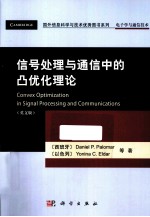图书介绍
信号处理与通信中的凸优化理论 英文版2025|PDF|Epub|mobi|kindle电子书版本百度云盘下载

- (西)帕洛马等著 著
- 出版社: 北京:科学出版社
- ISBN:9787030354303
- 出版时间:2013
- 标注页数:498页
- 文件大小:77MB
- 文件页数:512页
- 主题词:通信系统-信号处理-凸分析-研究-英文
PDF下载
下载说明
信号处理与通信中的凸优化理论 英文版PDF格式电子书版下载
下载的文件为RAR压缩包。需要使用解压软件进行解压得到PDF格式图书。建议使用BT下载工具Free Download Manager进行下载,简称FDM(免费,没有广告,支持多平台)。本站资源全部打包为BT种子。所以需要使用专业的BT下载软件进行下载。如BitComet qBittorrent uTorrent等BT下载工具。迅雷目前由于本站不是热门资源。不推荐使用!后期资源热门了。安装了迅雷也可以迅雷进行下载!
(文件页数 要大于 标注页数,上中下等多册电子书除外)
注意:本站所有压缩包均有解压码: 点击下载压缩包解压工具
图书目录
1 Automatic code generation for real-time convex optimization&Jacob Mattingley and Stephen Boyd1
1.1 Introduction1
1.2 Solvers and specification languages6
1.3 Examples12
1.4 Algorithm considerations22
1.5 Code generation26
1.6 CVXMOD:a preliminary implementation28
1.7 Numerical examples29
1.8 Summary,conclusions,and implications33
Acknowledgments35
References35
2 Gradient-based algorithms with applications to signal-recovery problems&Amir Beck and Marc Teboulle42
2.1 Introduction42
2.2 The general optimization model43
2.3 Building gradient-based schemes46
2.4 Convergence results for the proximal-gradient method53
2.5 A fast proximal-gradient method62
2.6 Algorithms for l1-based regularization problems67
2.7 TV-based restoration problems71
2.8 The source-localization problem77
2.9 Bibliographic notes83
References85
3 Graphical models of autoregressive processes&Jitkomut Songsiri,Joachim Dahl,and Lieven Vandenberghe89
3.1 Introduction89
3.2 Autoregressive processes92
3.3 Autoregressive graphical models98
3.4 Numerical examples104
3.5 Conclusion113
Acknowledgments114
References114
4 SDP relaxation of homogeneous quadratic optimization:approximation bounds and applications&Zhi-Quan Luo and Tsung-Hui Chang117
4.1 Introduction117
4.2 Nonconvex QCQPs and SDP relaxation118
4.3 SDP relaxation for separable homogeneous QCQPs123
4.4 SDP relaxation for maximization homogeneous QCQPs137
4.5 SDP relaxation for fractional QCQPs143
4.6 More applications of SDP relaxation156
4.7 Summary and discussion161
Acknowledgments162
References162
5 Probabilistic analysis of semidefinite relaxation detectors for multiple-input,multiple-output systems&Anthony Man-Cho So and Yinyu Ye166
5.1 Introduction166
5.2 Problem formulation169
5.3 Analysis of the SDR detector for the MPSK constellations172
5.4 Extension to the QAM constellations179
5.5 Concluding remarks182
Acknowledgments182
References189
6 Semidefinite programming,matrix decomposition,and radar code design&Yongwei Huang,Antonio De Maio,and Shuzhong Zhang192
6.1 Introduction and notation192
6.2 Matrix rank-1 decomposition194
6.3 Semidefinite programming200
6.4 Quadratically constrained quadratic programming and its SDP relaxation201
6.5 Polynomially solvable QCQP problems203
6.6 The radar code-design problem208
6.7 Performance measures for code design211
6.8 Optimal code design214
6.9 Performance analysis218
6.10 Conclusions223
References226
7 Convex analysis for non-negative blind source separation with application in imaging&Wing-Kin Ma,Tsung-Han Chart,Chong-Yung Chi,and Yue Wang229
7.1 Introduction229
7.2 Problem statement231
7.3 Review of some concepts in convex analysis236
7.4 Non-negative,blind source-separation criterion via CAMNS238
7.5 Systematic linear-programming method for CAMNS245
7.6 Alternating volume-maximization heuristics for CAMNS248
7.7 Numerical results252
7.8 Summary and discussion257
Acknowledgments263
References263
8 Optimization techniques in modern sampling theory&Tomer Michaeli and Yonina C.Eldar266
8.1 Introduction266
8.2 Notation and mathematical preliminaries268
8.3 Sampling and reconstruction setup270
8.4 Optimization methods278
8.5 Subspace priors280
8.6 Smoothness priors290
8.7 Comparison of the various scenarios300
8.8 Sampling with noise302
8.9 Conclusions310
Acknowledgments311
References311
9 Robust broadband adaptive beamforming using convex optimization&Michael Rübsamen,Amr EI-Keyi,Alex B.Gershman,and Thia Kirubarajan315
9.1 Introduction315
9.2 Background317
9.3 Robust broadband beamformers321
9.4 Simulations330
9.5 Conclusions337
Acknowledgments337
References337
10 Cooperative distributed multi-agent optimization&Angelia Nedi? and Asuman Ozdaglar340
10.1 Introduction and motivation340
10.2 Distributed-optimization methods using dual decomposition343
10.3 Distributed-optimization methods using consensus algorithms358
10.4 Extensions372
10.5 Future work378
10.6 Conclusions380
10.7 Problems381
References384
11 Competitive optimization of cognitive radio MIMO systems via game theory&Gesualso Scutari,Daniel P.Palornar,and Sergio Barbarossa387
11.1 Introduction and motivation387
11.2 Strategic non-cooperative games:basic solution concepts and algorithms393
11.3 Opportunistic communications over unlicensed bands400
11.4 Opportunistic communications under individual-interference constraints415
11.5 Opportunistic communications under global-interference constraints431
11.6 Conclusions438
Acknowledgments439
References439
12 Nash equilibria:the variational approach&Francisco Facchinei and Jong-Shi Pang443
12.1 Introduction443
12.2 The Nash-equilibrium problem444
12.3 Existence theory455
12.4 Uniqueness theory466
12.5 Sensitivity analysis472
12.6 Iterative algorithms478
12.7 Acommunication game483
Acknowledgments490
References491
Afterword494
Index495
热门推荐
- 770795.html
- 2006347.html
- 2600878.html
- 1519434.html
- 246635.html
- 2496555.html
- 387147.html
- 1166388.html
- 1296426.html
- 3053693.html
- http://www.ickdjs.cc/book_2436296.html
- http://www.ickdjs.cc/book_1243655.html
- http://www.ickdjs.cc/book_3054027.html
- http://www.ickdjs.cc/book_3605164.html
- http://www.ickdjs.cc/book_1041125.html
- http://www.ickdjs.cc/book_107395.html
- http://www.ickdjs.cc/book_1890665.html
- http://www.ickdjs.cc/book_3590980.html
- http://www.ickdjs.cc/book_478596.html
- http://www.ickdjs.cc/book_1191487.html